My mother, Hannele Blomqvist, was a refugee child in Sweden during World War II. From 2015-2017, her grandson (my son) Sven served a Mormon mission in Sweden. His dearest friends were refugees from Middle Eastern countries like Iran, Iraq, Afghanistan, and Syria. When I contemplate their experiences, I am reminded not only that “there but for the grace of God go I” but that God’s grace can be found in the refugee experience, both for refugees and for those who have the luxury of staying home. Of course, everything depends on how we respond to the newcomers among us.
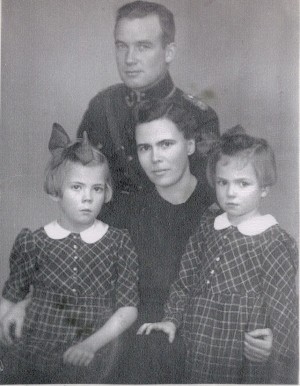 Finland at War
Finland at War
In 1944, when my mother was eight, her parents made the difficult decision to send her, along with 70,000 other Finnish refugee children to Sweden. Russia had invaded Finland, and the Finns, who had finally won their independence from Russia in 1917, were determined to fight to maintain that independence.
However, the Finns knew their chances of victory were slim against the powerful Soviet army. They wanted some of their children to escape the violence of war and the very real possibility of Soviet communist rule. My grandfather, a pilot in the Finnish air force, was especially concerned about the danger his family faced while living on an airbase, a likely target of a Soviet bomb attack.
My grandparents were part of a minority of Finns whose first language was Swedish. My mother and her older sister usually spoke Finnish, but they understood their parents’ Swedish, and my grandparents hoped this would help my mother adjust to a new life in Sweden. Still, I think it must have been almost unbearable for them to send their daughter away, not knowing who would care for her and whether they would ever see her again.
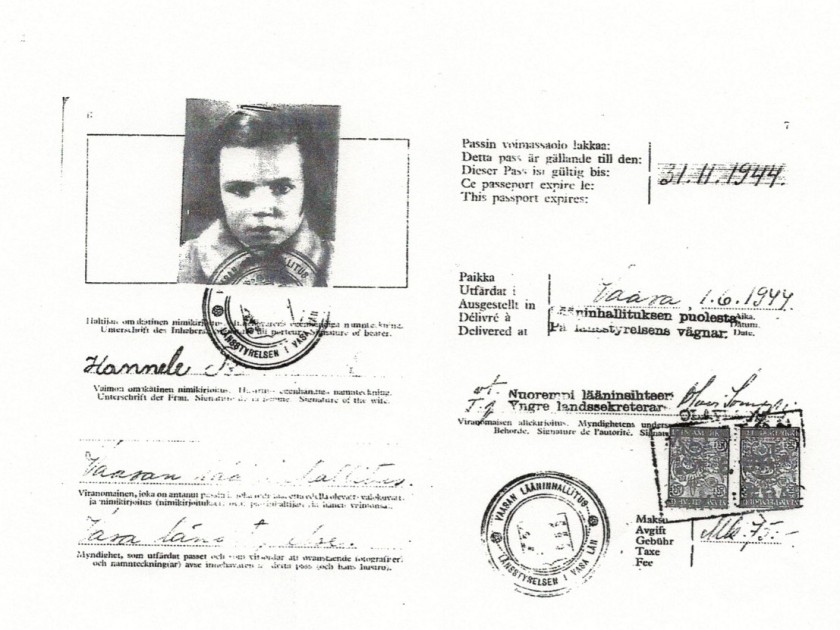
Here’s a picture of my mother’s passport, though it turned out she didn’t need it. Most refugee children were allowed to enter the country with just an identification tag around their necks.
An Unexpected Outcome
Some historians today argue that separating these Finnish children from their parents was a mistake. Some of the children were treated like servants, and many developed serious attachment disorders. Of course, if the Finns had not managed to drive the Russians out of their country, the historians might feel differently now. They have the luxury of criticizing the venture because the war ended a year later and most Finnish refugee children returned home to their families in a miraculously independent Finland.
Transition to a New Life
My mother’s year in Sweden was a happier one than some children experienced, but she did suffer at first from anxiety and homesickness. She remembers an interminably long train ride and then a new temporary home at a school in Stockholm, where she cried herself to sleep every night. However, her circumstances quickly improved after a young Mr. and Mrs. Lundén and their baby visited the school in response to a plea on the Swedish radio and took her home with them.
A Second Family for Hannele
Knowing Swedish did help my mother to adjust. She soon became close, not only to the Lundén couple with whom she lived during school days, but also with Mrs. Lundén’s large, close, and loving extended family with whom she spent weekends and holidays. Mrs. Lundén’s mother especially played an important role as the grandmother my mother never had, since her biological grandparents had all passed away when she was very young. And my mother was blessed to see in the Lundéns’ marriage relationship a happiness which seemed to elude my grandparents’ marriage, though my grandparents were both good people.
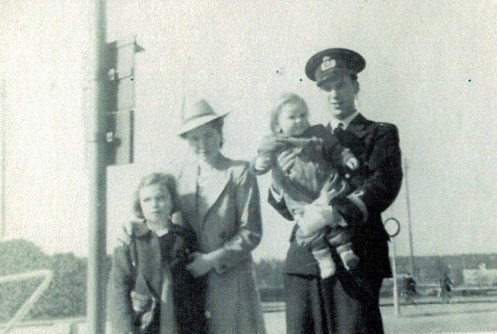 I believe that my mother’s relationships with the Lundén family also were aided by her own sweet nature and desire to please. Mr. Lundén was a formal navy officer and educator who wore a suit throughout much of my visit with him in 1980, even though he was long retired by then. Yet my mother tells stories of him paying her to comb his hair while he graded papers. In 1945 when he faced the prospect of sending my mother home, Mr. Lundén took the time to write her a poem about the light she had brought into his life and then decorated the poem with a border of flowers.
I believe that my mother’s relationships with the Lundén family also were aided by her own sweet nature and desire to please. Mr. Lundén was a formal navy officer and educator who wore a suit throughout much of my visit with him in 1980, even though he was long retired by then. Yet my mother tells stories of him paying her to comb his hair while he graded papers. In 1945 when he faced the prospect of sending my mother home, Mr. Lundén took the time to write her a poem about the light she had brought into his life and then decorated the poem with a border of flowers.
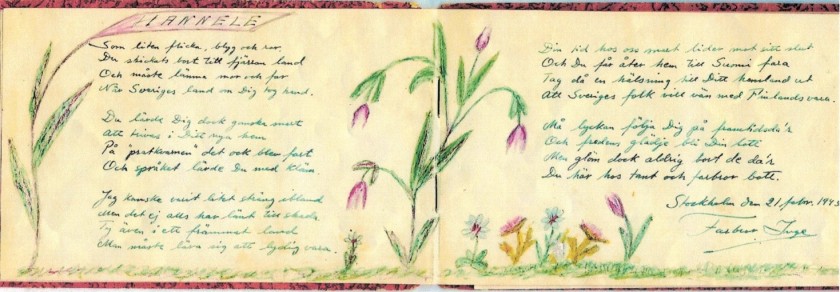
When I visited him 36 years later in 1980, he took me for a walk and showed me, with tears in his eyes, the building where my mother had attended school in Stockholm. Here’s a picture of me with the Lundén family in 1980. In between Mr. and Mrs. Lundén is Mrs. Lundén’s younger sister, Inga-Brita, and in front of Mr. Lundén is Mrs. Lundén’s special mother whom my mother adored.
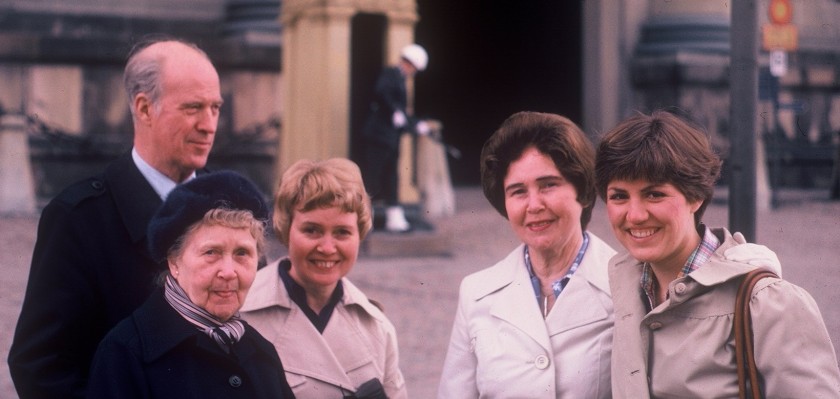
More Refugees in Finland
The Finns my mother returned to were grateful and stunned to occupy the only remaining independent country bordering Russia. However, they were also exhausted by the heavy price they had paid for this independence and overwhelmed by the task of re-claiming their lives. Much of their infrastructure was in shambles, almost an entire generation of their young men lay in graves, and their country was now geographically smaller.
In order to negotiate a peace treaty, they had conceded a large portion of eastern Finland to Russia. Consequently, long lines of eastern Finland’s residents were now entering independent Finland as refugees. This led to a serious housing shortage and a government mandate that Finnish citizens share any home with a greater number of rooms than occupants.
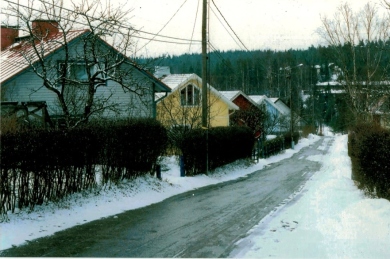 At the end of the war, my grandfather had started building a home in the city of Lahti. Shortly after moving in, his family turned over their two upstairs bedrooms to a 30ish-year-old woman named Selma and her mother. A carpenter and his son lived and worked in their basement bedroom. All three families shared the kitchen and a small bathroom in the basement. The carpenter and his son soon found a better place to live and work, but Selma and her mother stayed long enough to become life-long friends with my mother’s family.
At the end of the war, my grandfather had started building a home in the city of Lahti. Shortly after moving in, his family turned over their two upstairs bedrooms to a 30ish-year-old woman named Selma and her mother. A carpenter and his son lived and worked in their basement bedroom. All three families shared the kitchen and a small bathroom in the basement. The carpenter and his son soon found a better place to live and work, but Selma and her mother stayed long enough to become life-long friends with my mother’s family.
Multi-Generational Friendships
Mom also maintained close ties with the Lundén family and visited them during the two summers she worked in Sweden as a teenager. In her adult life, after she had moved to the United States, she rarely made a trip to Finland without scheduling a detour to Sweden to see the Lundéns.  About ten years ago, the Lundéns’ granddaughter Stella
About ten years ago, the Lundéns’ granddaughter Stella
spent a year as an exchange student with my brother’s family in Provo, Utah, and in 2015, Stella’s parents, Håkan and Ingrid, made a special trip to Utah from Sweden just to celebrate my mother’s 80th birthday with her. Håkan was not born until about ten years after my mother’s year in Sweden as a refugee child, but because of deep bonds that have lasted several generations between his family and ours, he is as important to my mother as anyone else in his family. Unfortunately, I don’t have a picture of them at the 80th birthday party, but here they all are about ten years earlier, visiting the Mormon tabernacle together in Salt Lake City.
A Changed World View
Mom’s life was profoundly affected by her experiences both as a refugee child and as part of a host family to fellow country men and women in need. Her world became larger. She experienced people and relationships that compensated for what she sometimes lacked in her immediate family relationships. She found courage and gained confidence. She learned that the strange and unfamiliar could become valuable and beautiful to her. She desired to learn more about the world first-hand and in fact took a detour after one summer of work in Sweden to hitch-hike throughout Europe with a friend–waiting until she arrived home to inform her father of the trip.
Above all, her experience made her more open than she might have been to the teachings of the LDS church (commonly referred to as the Mormon church), to which she was introduced in her teenage years. Her eventual baptism into the LDS church changed the course of her life and resulted in her emigrating at the age of 21 to the United States.
In a future blog post, I will discuss more about her immigration experience, and in yet another post I will try to explain the many ways her experience has affected my life and my world view. However, right now I need to fast forward over seventy years to my son Sven’s recent experience with refugees in Sweden.
Hannele’s Grandson Sven Visits Sweden
You might already know that many young 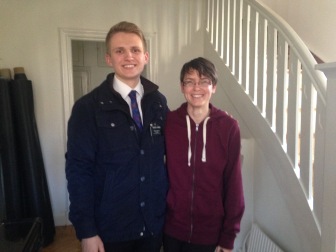 LDS men and women serve 18 month to 2 year missions for their church throughout the world. The process begins with their sending in an application to church leaders, and then they wait for a “mission call” which tells them where they have been assigned to labor.
LDS men and women serve 18 month to 2 year missions for their church throughout the world. The process begins with their sending in an application to church leaders, and then they wait for a “mission call” which tells them where they have been assigned to labor.
When Sven was “called” to Sweden, our family were of course thrilled that he would have the opportunity to learn more about Scandinavian culture, and we were especially delighted that Sven was able to visit Stella Lundén in Stockholm recently.
But Sven’s experience in Sweden was also deeply enriched by his humanitarian work with many Muslim refugees and immigrants from Middle Eastern cultures like Iran, Iraq, Afghanistan, and Syria. Many reached out to him in kindness and friendship, displaying a culture of hospitality so appealing to Sven that he is thinking about pursuing a degree in Middle Eastern studies.
Swedes Help Refugees/ Refugees Help Sven
Sven was only a few blocks away from the terrorist attack in Stockholm last April, and he witnessed several angry demonstrations of white supremacist groups who feel threatened by the large influx of Middle Easterners in the country. But Sven also saw many Swedes successfully helping his Middle Eastern friends to assimiliate into Swedish culture, and his personal experience with the vast majority of Middle Easterners was overwhelmingly positive. Sven was especially moved by the generosity of these friends even in the aftermath of terrible trauma and even midst conditions of extreme poverty and hardship.
Unfortunately, most of these friends aren’t able to live with a Swedish host family, as my mother did. They are at first dependent on the housing and help the government gives them, and then they transition into modest apartments as they gradually learn the language and find jobs often far beneath their education and skills levels. Sven met many refugees living in large numbers in tiny apartments with little or no furniture. Yet almost always they wanted to feed him and learn his story.
Finding Common Ground
Sven found much common ground to celebrate with his Muslim friends, who value kindness, generosity, modesty, humble reliance on a higher power, and a “plan” for God’s children which includes many similarities to the one Sven espouses. Perhaps the most important commonality between Sven and his middle Eastern friends, however, is that they all know what it feels like to begin a new life in a new country with a new language.
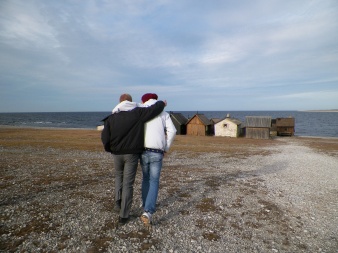 The Language of Love
The Language of Love
That language barrier can especially be a problem, and Sven deeply wished he knew Persian and Arabic so he wouldn’t have to rely so much on Google Translate and charades to communicate. But Sven also assures us that language barriers do not have to stop us from being friends with people of other nations. Love is a universal language understood by all God’s children. Love and friendship especially can happen between displaced peoples who recognize each other as travelers sharing a new experience and dependent upon each other’s kindness and mercy.
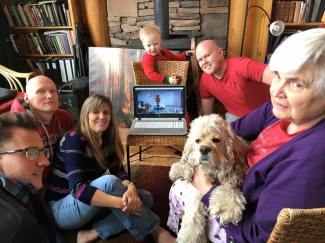 An Invitation
An Invitation
Last Christmas when our family skyped with Sven, he spoke Swedish for the first time with his grandmother and I sensed deep gratitude within her for this opportunity. I wish that we could all contribute to this conversation in our native languages, and if you want to do so, I’ll try my best with Google Translate to understand you. But I’ve seen what Google Translate does to Finnish and I have to say that English might still be our best bet! If you share a desire to be part of this international community of friends, I warmly welcome you and so look forward to hearing your stories! I especially hope to hear from those who are refugees or who work with refugees. Why did you or your friends have to leave home? What was most difficult about the move? What good has come from the experience? What are your or your friends’ hopes and desires for the immediate and more distant future?
I look forward to hearing from you.


I have heard you reference your mother’s time in Sweden several times, so I was very interested to read about it in more detail. I think it’s valuable for readers to see that the refugee experience has happened to Europeans as well and that it’s not just an issue for a group of people that are somehow “unrelatable” when we are all interconnected in deep and profound ways. Thank you!
LikeLike
Dear Denise,
This is such a beautiful and important initiative. I used to hear stories and have long talks about everything between heaven and earth when I worked with refugee youth, and I often thought that if everyone could just listen in on those conversations we could get rid of all that is prejudice and hostility toward the other very easily.
I also loved reading our families’ story from your point of view. It was such a happy thing being able to have Sven and his companion over when he was here. You are all family to me, and I hope I’ll see you again some time soon.
My love to everyone,
Stella
LikeLike
Stella, we were watching some old home videos the other day and there you were singing Tip Tap in Swedish! I hope to see you soon too. We are trying to find cheap tickets to Sweden next summer! I would surely love it if some of your refugee friends would tell their story on this blog. They can do it in the comment section, and then I might copy and paste it (with their permission) in a new blog post.
LikeLike
Oh, I hope you do come to Sweden next summer! And I’ll spread the word about the blog to see if anyone wants to publish their story.
LikeLike